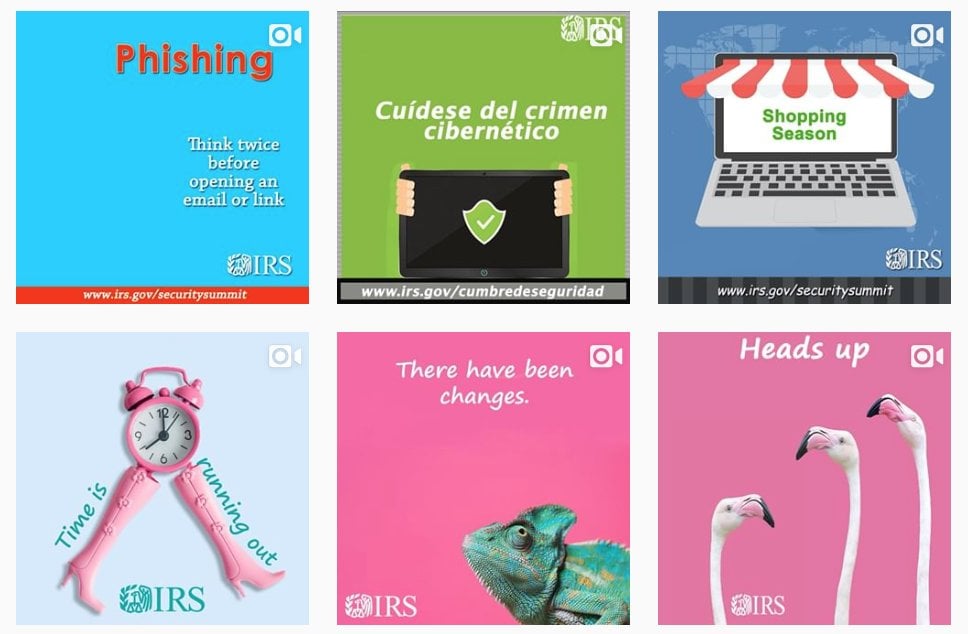You won’t find dank memes or bureaucratic selfies on the IRS’ new Instagram account. So what kind of content should users expect from the tax agency? I chatted with Terry Lemons, the IRS’s chief of communications, and Sara Eguren, the agency’s head of social media, to learn just how they plan to make dry tax info enticing to users of a most visual social platform.
Washingtonian: Of all the projects and platforms, why Instagram?
Lemons: Instagram’s another natural outgrowth of some other work we’ve been doing on social media. You know, it’s a nice place to have a little fun with the visuals and give people a chance to get more information if they need because we’re coming up on a real big tax season.
And how are you going to have fun?
Lemons: Well, take a look at the first post—pretty and pink. It’s not what you typically think about with the IRS. It’s eye-catching. Sara and her team are having some fun with the visuals. Taxes are never going to have as many followers as a movie star or a pop star. But it is a venue to share information. Look, the refund check is the biggest most Americans get all year. If we’re able to get a little information to help people get ready for the upcoming tax season, that’s a good thing.
https://www.instagram.com/p/Bqz7uKPhqsd/
Are you trying to target millennials specifically?
Lemons: We’d love to reach younger taxpayers. But you’ve got people of all ages, really, out on Instagram. Out on Twitter and platforms like that. The fact is that times are changing, and the IRS is changing as well.
Are there other government agencies that you guys want to emulate? I’m thinking about the Department of Agriculture, the Department of Defense.
Lemons: We’ve certainly taken a look at some of those—but we’re really in a unique situation as a government agency. When you take a look at what places like NASA have done on social media, that’s really fun stuff. We have to take a little different approach, but it’s an opportunity for us. Again, we’re a tax agency! So people don’t expect us to put pink flamingo up on one of our social media platforms.
Members of Congress use social media to speak to their constituents—Representative-elect Alexandria Ocasio-Cortez is a good example. She’s on Instagram stories, cooking for her constituents and discussing policy. Will you use Instagram stories similarly to engage your followers?
Eguren: We might, but it won’t be something like that. We won’t be filling out taxes on camera. But we may be able to do a step-by-step at some point and try to keep it lighthearted. One of our big things coming up is tax security. Later on we have a lot coming up on tax reform changes and how they affect the bottom line of small businesses.
Did you expect to have such a buzzy launch?
Eguren: Of course!
Lemons: You know, one of our goals is reaching people we don’t normally talk to. I can’t recall offhand the last time we had someone from the Washingtonian call over and talk to us. We knew we would get a good number of followers. Our question is really how far do we go? For us it’s going to be interesting to see where we’re at in the next couple months.
So what I’m hearing is the Instagram’s primary use is to get out information, whether it’s about tax security or other internal IRS initiatives, but also to be a little light with it at the same time?
Lemons: That’s right. And what we’re seeing, tax issues can affect everybody. And one of the things we continue to have concerns about is phone scams. This is one more way of getting out that consumer friendly information.
Eguren: It’s a matter of meeting the taxpayers where they are. This is not just fun for fun’s sake but rather to bring attention to issues that are really going to affect taxpayers. It’s an attention-grabber but it really is a matter of spreading the word on important issues.
And how are you going to measure success?
Lemons: Well, there’s a couple ways. Obviously we’re going to keep an eye on followers and see what kind of reaction [we get]. But ultimately this feeds into the upcoming tax season. Are we getting the information out to people? One measure for success for is are we going to be able to get that basic information out when they’re filling out their tax return.
Eguren: It is a lot of fun, but we’re doing a lot of interesting things on Twitter and Facebook and on our YouTube videos, too. We’re really trying to expand our social media reach to get the messages out to more taxpayers.
Lemons: Compared to other agencies we’re not as active in social media; that’s kind of the nature of our business. There are a lot of sensitive issues; people don’t really want to talk about tax issues out on social media. It’s not like we’re going to be going out onto the dating apps. So people don’t need to worry about that.



















